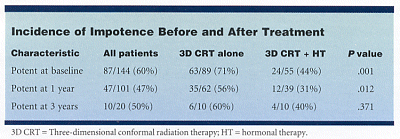Impotency Tied to 3D CRT, Not Hormone Therapy
BOSTON-Men who underwent three-dimensional conformal radiation therapy (3D CRT) for prostate cancer had significant loss in sexual function, but the addition of hormonal therapy did not exacerbate that loss, according to a poster presented at the 42nd Annual Meeting of the American Society for Therapeutic Radiology and Oncology (ASTRO).
BOSTONMen who underwent three-dimensional conformal radiation therapy (3D CRT) for prostate cancer had significant loss in sexual function, but the addition of hormonal therapy did not exacerbate that loss, according to a poster presented at the 42nd Annual Meeting of the American Society for Therapeutic Radiology and Oncology (ASTRO).
Christopher T. Chen, MD, a resident in the Department of Radiation Oncology, Kimmel Cancer Center, Jefferson Medical College of Thomas Jefferson University, Philadelphia, reported on a study of 144 men who completed sexual function questionnaires before treatment and at 6-month intervals when they returned for follow-up.
The patients were from a database of prostate cancer patients treated by Richard K. Valicenti, MD, assistant professor of radiation oncology, Jefferson Medical College, and lead author of the study.
Dr. Chen reported that 1 year after 3D CRT, 47% (47 of 101 patients) were totally potent, compared with 60% (87 of 144 patients) before treatment (see Table). The percentage increased slightly to 50% (10 of 20) among those who had at least 3 years of follow-up.

The 55 patients who also received hormonal therapy were less likely to be potent before and after radiotherapy than the men who only had 3D CRT.
Less than half of the hormonal therapy patients (24, or 44%) were potent at the outset, compared with nearly three fourths (63, or 71%) of the 89 men who had 3D CRT alone. A year later the percentages dropped to 31% and 56%, respectively. In the small group of men who had been followed for 3 years, potency recovered to 40% and 60%, respectively.
Dr. Chen and Dr. Valicenti concluded that the difference in the degree of potency loss was not significant between the two groups.
The patients also reported decreases in ejaculatory ability and quality of sex life. At baseline, 59% of all patients were at least partially satisfied with their sex life: 51% of the hormonal therapy plus 3D CRT group vs 65% of the 3D CRT-only group. At 1 year, partial satisfaction was measured at 55% of all patients: 42% of the hormonal group and 63% of the 3D CRT-only group.
"The quality of the data is very good," Dr. Chen said, stressing that the patients were queried before they started treatment and every 6 months afterward. Many studies ask patients to recollect potency before treatment, he noted. "But the patients can’t remember. It can be 5 years since they started therapy," he said.
In this study, the mean follow-up time was 21 months, and the men were given a definition of sexual potency as erections firm enough for penetration during intercourse on at least two occasions in the previous 30 days.
Prolaris in Practice: Guiding ADT Benefits, Clinical Application, and Expert Insights From ACRO 2025
April 15th 2025Steven E. Finkelstein, MD, DABR, FACRO discuses how Prolaris distinguishes itself from other genomic biomarker platforms by providing uniquely actionable clinical information that quantifies the absolute benefit of androgen deprivation therapy when added to radiation therapy, offering clinicians a more precise tool for personalizing prostate cancer treatment strategies.